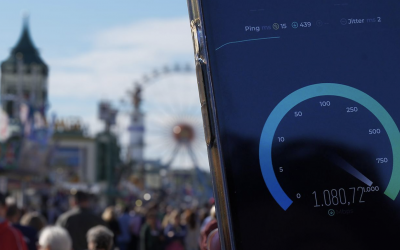Almost a third of German users fear that AI technology is developing too quickly, while a quarter are not willing to share sensitive information with chatbots, according to a new study by NordVPN.
Most people are still getting used to AI technology, which not so long ago seemed more like a fantasy than reality. The line between these worlds still seems blurred. Currently, there is a worrying tendency among Germans to mistake AI-generated content for reality.
The vast majority of German users (92%) do not trust themselves to recognise AI-generated images, although 13% admit to having created such images themselves using a chatbot.
‘The AI revolution is here, and its rapid development is changing the way we live and work. While AI chatbots are useful tools, it is important to pay attention to data protection, privacy, and security when using them to avoid becoming a target for cybercriminals,’ says Marijus Briedis, CTO at NordVPN.
Germans are annoyed by AI chatbots
In Germany, the use of AI chatbots is low, with only 10% of users using them daily. It seems that people are still much more comfortable receiving support from other humans. 19% of respondents even say that they are annoyed when companies use AI chatbots for customer support. This is especially true for Generation X (44 to 59 years old).
Almost a third (29%) of AI chatbot users fear that AI is developing too quickly, with baby boomers (60 to 78 years old) expressing the greatest concern at 38%. All these reasons, together with the current limitations of AI chatbots, mean that they are only slowly becoming part of everyday life.
At the same time, only 11% of respondents are concerned that AI will replace them in the workplace at some point. Millennials (28 to 43 years old) and Generation Z (18 to 27 years old) are most concerned.
‘AI is changing the world of work. Research shows that younger people and those with higher levels of education are adapting more quickly to AI and are more likely to view artificial intelligence as a useful tool for their work. The focus here is on cybersecurity. We no longer just protect traditional digital landscapes, but are securing a future in which AI is intertwined with every aspect of our work. This requires constantly evolving security measures, guidelines and training programmes that help employees adapt to the rapidly changing digital environment,’ says Briedis.
Generation Z is the least interested in learning how to use AI
On a positive note, 32% of all Germans are keen to learn more about AI in order to better prepare themselves for the technological future. Baby boomers are the most interested in AI, with 36% showing interest, while Gen Z is the least interested.
Interestingly, the data challenges conventional wisdom and shows that older generations are more engaged with AI. This finding challenges the notion that older generations are disconnected from technological advances.
Generation Z (18-27 years old) show the least interest compared to other groups, suggesting a potential gap in the adoption and understanding of this technology among this demographic.
Only one in ten people use AI chatbots regularly in their daily lives, for example to create AI images, while only 10% of respondents use them for work and just 4% for school or university.
Expert advises how to feel safer when using AI chatbots
A quarter of respondents avoid sharing sensitive data with AI because they don’t trust it. This contributes to the fact that only 6% of Germans have ever been victims of AI fraud. The most sceptical groups, who clearly distrust AI, are baby boomers and people with lower incomes.
This shows that Germans are particularly aware of fraud attempts involving AI. To be safer when dealing with AI, Marijus Briedis gives some tips:
- Avoid sharing sensitive data such as your full name, address, financial information, or other personal details unless absolutely necessary.
- Read the service provider’s privacy policy before using a chatbot to understand how your data is collected, stored and used.
- Use pseudonyms, disposable email addresses or virtual private networks (VPNs) to conceal your true identity and location.
- Do not share personal information in public or unsecured environments – such as open Wi-Fi networks – where your digital communications could potentially be intercepted or monitored.
- Ensure that your devices and the applications you use to access AI chatbots are regularly updated with the latest security patches to minimise vulnerabilities.
- If you encounter any suspicious or unauthorised activity involving your personal data while using or after using an AI chatbot, report it to the service provider and relevant authorities immediately.
Methodology: This research was commissioned by NordVPN and conducted by Cint between 18-28 November 2020. A total of 4,000 respondents from Germany, Japan, Italy, and Brazil between the ages of 18 and 74 were interviewed. The experts set quotas for the gender, age, and place of residence of the respondents in order to obtain a nationally representative sample of internet users.



